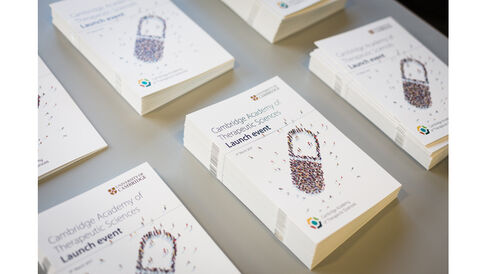
On 9 March, Vice Chancellor Professor Sir Leszek Borysiewicz and Pro-Vice Chancellor for Research, Professor Chris Abell welcomed an audience of 150 pharmaceutical and biotech company leaders, industry and professional body representatives, and senior academics to hear about the mission and vision of the Cambridge Academy of Therapeutic Sciences (CATS). This new initiative aims to establish a world-leading platform for collaboration between academia and industry in the development of therapeutics
The Vice Chancellor said “There are few places in the world as well placed as the University of Cambridge to take advantage of the highly multidisciplinary scenario that is evolving in healthcare research and development. The Cambridge Academy of Therapeutic Sciences will ensure that this capacity is fully exploited to speed up the development of new treatments that will benefit patients locally, nationally and internationally.”
Sir Andrew Witty, CEO of GlaxoSmithKline delivered a captivating keynote lecture on challenges and opportunities in healthcare innovation, stressing the importance of the pharmaceutical sector considering and adopting value-based pricing models. Turning to the talent behind progress he stated that diversity of people combined with advancing technology is a double accelerator for innovation and set out a clear challenge for CATS to enable serendipity, especially engaging the “born digital” generation, in order to drive new discoveries.
With the scene set, Professor Chris Lowe, CATS Director, explained the thinking behind the Academy and outlined his vision for its development into the place to go for research development support and world-class postgraduate education relevant to the life science industries - from small molecule and biologics drug development, to stem cell technologies and medical devices.
“With CATS, we will develop a new way of fostering and supporting the community in and around Cambridge, working across academia and industry to co-develop new concepts, deliver new knowledge, and to produce people who are better educated in all elements of modern therapeutics” said Professor Lowe. “We believe the opportunities that CATS provides for research, collaboration and education will attract academic and industrial researchers from around the world.”
Professor Anne Willis, Director of the MRC Toxicology Unit – which will soon move to Cambridge from its current home in Leicester – kicked off a series of short but information packed scientific talks. These covered diverse topics including clinical trials, cell therapies, psychiatric disease biomarkers and bioelectronic medical interventions and were delivered by speakers from the School of Clinical Medicine, the School of Technology and interdisciplinary start-up Galvani Bioelectronics.
In the following panel discussion, the audience had the opportunity to quiz senior industry executives and University researchers about the challenges encountered when developing new drugs and other medical products, and the disruptive science and innovation needed to help overcome them. The panel Chair, Dr Andy Richards CBE, echoed the sentiment of Sir Andrew’s earlier speech, predicting more patient-centric healthcare system in the future. He also pointed out the need for more adaptive regulatory processes to keep pace with innovation.

Jane Osbourn, VP Research and Development at MedImmune, cited the importance of biomarkers and diagnostics for the development of precision medicine and the role of biosimilar therapeutics in reducing costs. Professor Ken Smith form the Department of Medicine stressed the importance of building relationships at the individual level with industry collaborators, something with which Richard Mason, Head of Johnson & Johnson Innovation in Europe wholeheartedly agreed. And Professor Clare Bryant, Professor of Immunopharmacology in the Department of Veterinary Medicine spoke of her experience as a visiting professor for Genentech where she helped the company in their research efforts into aspects of innate and adaptive immunity, which are applied to the understanding and treatment of autoimmune and inflammatory disorders.
The event closed with a networking reception giving attendees the chance to talk in more detail with each other and the CATS team. Dr Paula Frampton, Executive Manager of CATS commented “The success of today’s event and the fantastic buzz generated from the participants is a great boost as we take this exciting initiative forward. We look forward to working together with the therapeutic sciences community across Cambridge and beyond in the coming months.”
